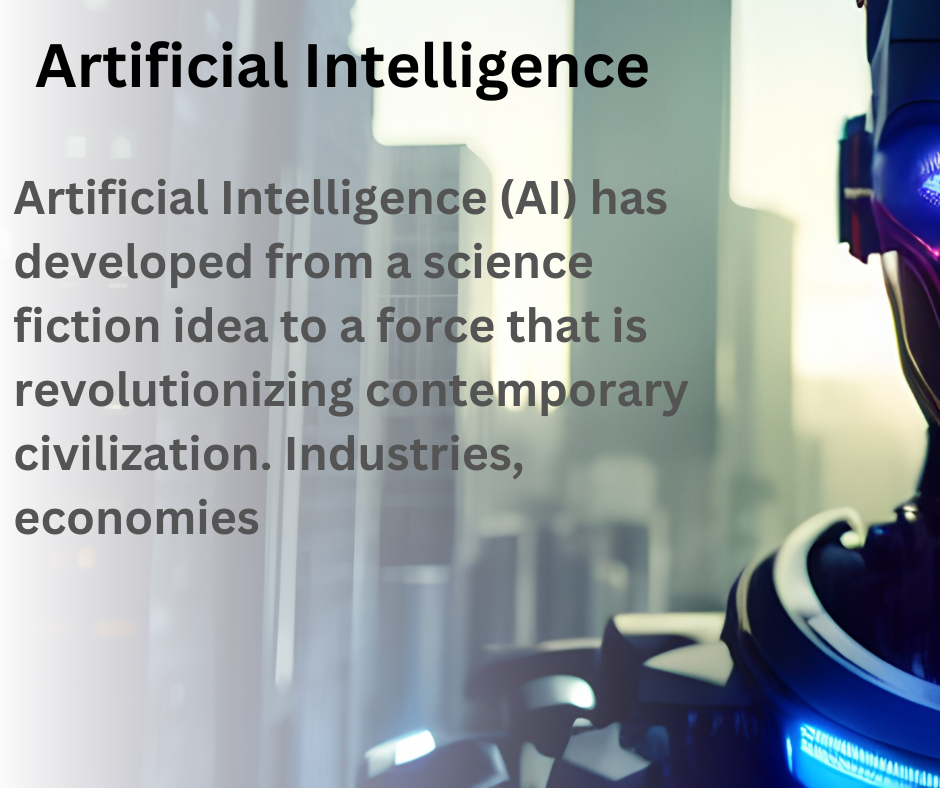Artificial Intelligence (AI) has developed from a science fiction idea to a force that is revolutionizing contemporary civilization. Industries, economies, and everyday life are changing as a result of this technology, which uses computers and other devices to mimic human intellect. AI has a huge and diverse impact, spanning from its historical foundations to its modern uses.
Artificial Intelligence: Its Development and Significance
Historical Background
-
- The idea of artificial intelligence (AI) originated in mythology and tales of artificial beings with sentience that extend back thousands of years. Nonetheless, the mid-1900s saw the official establishment of AI as a scientific field. The field of artificial intelligence (AI) was first studied in 1956 at the Dartmouth Conference, where pioneers like Allen Newell, Marvin Minsky, and John McCarthy laid the foundation for later research.
- Symbolic reasoning and problem solving were the main topics of early AI research. The General Problem Solver and the Logic Theorist were two examples of programs that tried to simulate human thought processes. These early systems’ shortcomings prevented them from handling complicated, real-world scenarios, despite their early triumphs.
Neural Networks and Machine Learning
-
- AI was completely changed in the 1980s and 1990s with the introduction of machine learning (ML). In contrast to previous rule-based systems, machine learning algorithms have the ability to learn from data and gradually improve. Neural networks, which were developed with inspiration from the structure of the human brain, served as an example of this change.
- In applications like speech and picture recognition, neural networks—in particular, deep learning models—have shown impressive results. Deep learning has gained considerable traction in both academia and industry as a result of AlexNet’s success in the 2012 ImageNet competition.
- AI in Typical Life
-
- Artificial intelligence has impacted many facets of daily life, frequently in subtle ways. To communicate with people, natural language processing is used by personal assistants such as Siri, Alexa, and Google Assistant. Products and content are suggested by recommendation algorithms on websites such as Netflix and Amazon based on user activity.
- AI helps in disease diagnosis, patient outcome prediction, and treatment plan personalization in the healthcare industry. Radiology, for example, gains from AI’s high accuracy of anomaly detection in medical imaging. Additionally, through the prediction of molecular behavior and possible drug efficacy, AI-driven drug discovery expedites the creation of new pharmaceuticals.
- Algorithmic trading, fraud detection, and customer service automation are three areas where the financial industry uses AI. AI systems are able to detect patterns and abnormalities that are impossible for people to manually identify by examining large datasets. Financial institutions gain a competitive advantage as a result of improved security and operational effectiveness.
- Independent Systems
-
- Autonomous systems, especially self-driving automobiles, are one of the most revolutionary uses of AI. In order to lessen accidents, enhance traffic flow, and give those who are unable to drive mobility, companies like Tesla, Waymo, and Uber are leading the way in the development of autonomous vehicles.
- Robots and autonomous drones are also becoming more common in a variety of businesses. Drones in agriculture maximize the application of pesticides and monitor crop health. Robots in logistics automate warehouse activities, boosting productivity and cutting labor expenses.
Moral Thoughts
-
- Significant ethical questions are brought up by the quick development of AI. Public discourse is centered on issues like algorithmic prejudice, data privacy, and employment displacement. AI systems frequently rely on enormous volumes of personal data, which raises concerns about security and permission. To avoid discrimination and uphold public confidence, it is imperative that AI algorithms remain transparent and devoid of bias.
- Another serious problem is job displacement since automation poses a danger to the jobs of human labor in many different industries. Even while AI has the potential to create new jobs, the shift will need a lot of adaption and reskilling.
The AI’s Future
AI has a very bright future, but there may be difficulties as well. Future developments in AI research should produce increasingly complex and powerful systems. In the long run, fields like general artificial intelligence (AGI), in which machines are able to think like humans, are still goals.
The application of AI to global issues like healthcare, education, and climate change is also becoming more and more significant. AI-driven solutions can help create a more just and sustainable world by predicting environmental changes, optimizing energy use, and offering individualized learning experiences.


